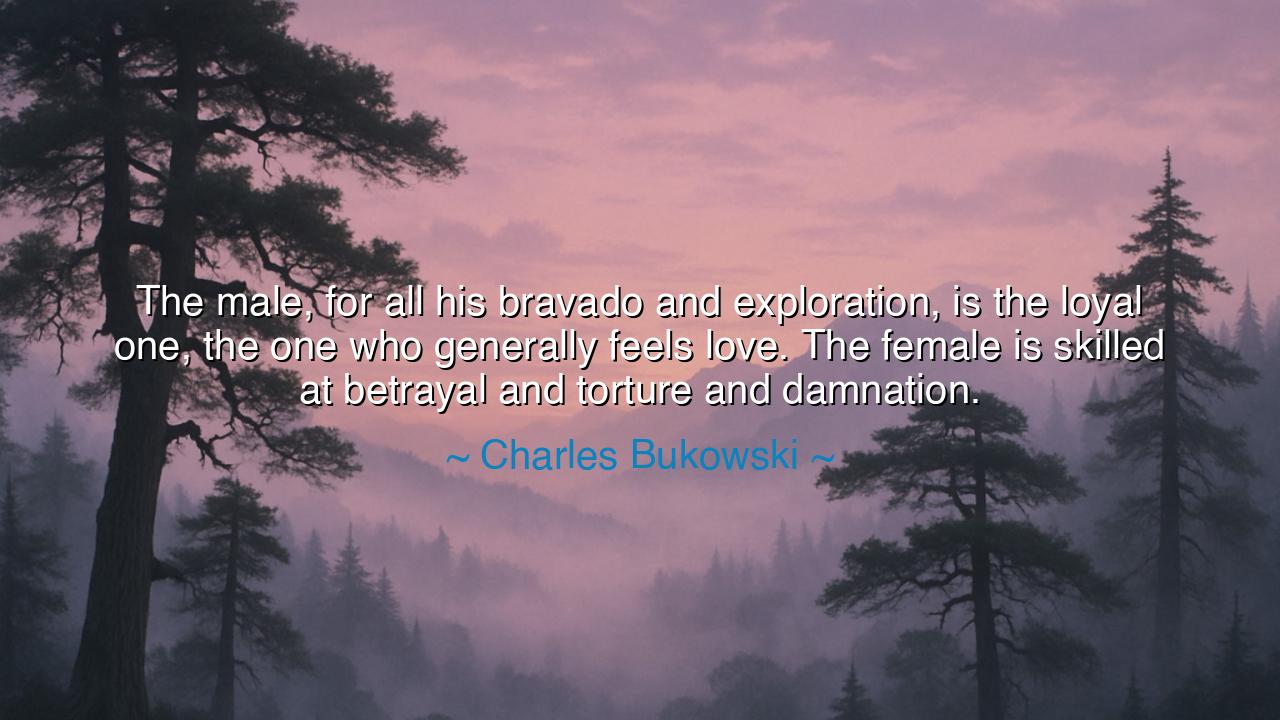
The male, for all his bravado and exploration, is the loyal one
The male, for all his bravado and exploration, is the loyal one, the one who generally feels love. The female is skilled at betrayal and torture and damnation.






“The male, for all his bravado and exploration, is the loyal one, the one who generally feels love. The female is skilled at betrayal and torture and damnation.” Thus wrote Charles Bukowski, the poet of the streets and the chronicler of wounds — a man who drank deeply from both the cup of love and the chalice of bitterness. His words are not the calm reflections of a philosopher, but the cry of a soul scorched by passion, by disappointment, and by the eternal conflict between longing and loss. To understand this quote, one must first understand Bukowski himself — a man who loved fiercely, fell often, and found in women both his muse and his undoing.
Bukowski wrote from the underbelly of life, not from its heights. He saw love not as the poets of old — as something pure and transcendent — but as something raw, carnal, dangerous, often laced with cruelty. His world was filled with bars, broken hearts, and the unspoken violence that hides within desire. In this, his quote is not a declaration of universal truth, but a confession of pain. When he speaks of the “male” as loyal and feeling love, and of the “female” as one who betrays and condemns, he is describing not womankind as a whole, but the battlefield of his own experience — the way love, once sacred, had turned to warfare in his life.
For Bukowski, the male represents the dreamer, the fool of devotion — the one who throws himself into passion without armor. His bravado and exploration are but masks for a heart that secretly yearns for connection. Beneath his roughness lies a terrible tenderness, the kind that makes him suffer more deeply than he will ever admit. He loves not because he must, but because he cannot help it. His loyalty is his curse, for it ties him to those who may not understand or return it. Bukowski saw in men a tragic vulnerability — a longing to believe, to worship, even as the world teaches them cynicism.
By contrast, when he speaks of the female as “skilled at betrayal and torture and damnation,” he is not describing evil, but power — the power of the one who holds love’s fate in her hands. In his view, women were the arbiters of emotion, the keepers of mystery, the ones who could wound most precisely because they were loved most deeply. This vision of the feminine as dangerous is born not of hatred, but of awe. He paints women as elemental — capable of creation and destruction, tenderness and cruelty, often within the same breath. They are the mirror and the fire, reflecting a man’s soul while consuming it.
Yet, if we step back from Bukowski’s bitterness, we can see a deeper wisdom hiding in his exaggeration. His words, though harsh, reveal the fragility of love itself — how it exposes both men and women to pain, how it awakens the capacity to wound as well as to heal. Every lover, regardless of gender, walks a knife’s edge between devotion and destruction. In this sense, Bukowski’s quote is not truly about men or women, but about the human condition — how love, once awakened, becomes a force larger than morality or control.
Consider the tragic story of Samson and Delilah, from the ancient scriptures. Samson, mighty and fearless, was undone not by an army, but by the one he loved. Delilah’s betrayal, like the betrayal Bukowski speaks of, was not merely personal — it was mythic, symbolic. It showed that even the strongest hearts can be broken, and that love, when mixed with power, becomes perilous. Yet even in his blindness and ruin, Samson’s story endures because it captures the same truth Bukowski knew: that love and pain are twin threads woven through the soul.
From this reflection, a lesson arises — one of balance and awareness. Love is neither purely noble nor purely cruel; it is both a sanctuary and a battlefield. The wise do not flee from it, but neither do they surrender blindly. They love with open eyes, knowing that the same flame that warms can also burn. To feel deeply is both the greatest blessing and the greatest risk, but to live without feeling is to live half-alive.
So, O seekers of the heart, take Bukowski’s words not as condemnation, but as warning. Know that love will test you, unmake you, and reveal what lies hidden in your depths. Be loyal, yes — but not blind. Be passionate, but not possessive. See the humanity in the one you love, and forgive the frailty in yourself. For in the end, as Bukowski himself might have whispered between drinks and dreams, love remains the most dangerous and the most necessary of all human acts — the one that wounds, and the one that saves.






AAdministratorAdministrator
Welcome, honored guests. Please leave a comment, we will respond soon